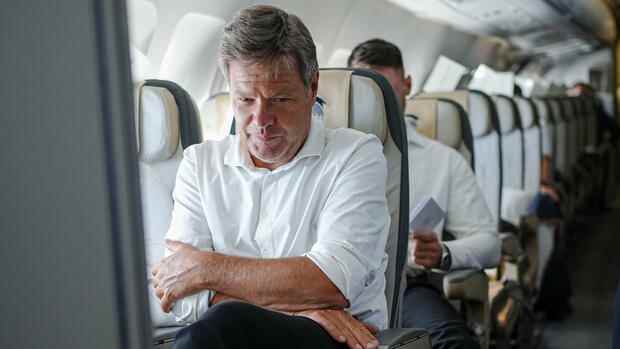Berlin This is how Robert Habeck would like to see himself more often in the office of Economics and Climate Protection Minister: The Green politician is standing late Sunday evening in the “Bar George”, a 140-year-old building in the heart of eastern Canada’s Montréal. Magnificent wood paneling adorns the room, wine glasses clink.
The German Embassy in Canada has invited to the reception. Habeck is used to people crowding around him on such occasions. This time, however, you can see that he feels more comfortable in the situation than usual. He laughs a lot, hands out pats on the back and receives them.
For three days, Habeck is traveling through Canada together with Federal Chancellor Olaf Scholz (SPD). At the same time, he was having dinner with Canadian Prime Minister Justin Trudeau. And so the stage in the “Bar George” belonged entirely to Habeck.
But that should be less of a reason for Habeck’s good mood than the fact that he can finally devote himself to his core topics again this evening. In December, when Habeck took office as transformation minister, he now has to deal with the gas crisis, which is spreading more and more, every hour and grapple with a topic that is extremely annoying for a Green Party, nuclear power.
Top jobs of the day
Find the best jobs now and
be notified by email.
In Canada, Habeck can leave the acute crisis behind for a short time, at least it seems so. According to the minutes, the focus of the trip is clear: future topics are on the agenda. Above all, it is about hydrogen, the great hope for the decarbonization of the German economy. On Tuesday, Germany and Canada want to decide on cooperation on hydrogen in the presence of Scholz, Habeck and Trudeau.
Various future topics are on the program for the visit.
(Photo: dpa)
Discussions are also pending on raw materials such as nickel, lithium and copper, which are so important for the energy transition. So on Sunday evening, Habeck withdrew briefly from the hustle and bustle in the “Bar George” and chatted in the next room with Jonathan Wilkinson, Canada’s Minister for Natural Resources, about the extraction, transport and use of raw materials.
Daimler and Volkswagen, whose managers are part of the business delegation that traveled with them, also want to conclude agreements on cooperation with Canada in this area on Tuesday.
The problem is the infrastructure in Germany
But even 6,000 kilometers away from Berlin, the national crisis does not let go of the vice chancellor. Shortly before midnight we go a few streets further to the hotel and there on a terrace with a view of downtown Montréal. Habeck is switched on to the ZDF “Morgenmagazin” – and immediately brought back to the reality of the crisis with the introductory words of the presenter: In the short term, all the things that he discusses in Canada, yes not help.
In fact, the North American country has large gas reserves, but so far there are no transport options to bring the gas to Germany. That’s not a problem either, Habeck said.
>> Read here: China is running, Germany is slowing down: Berlin is delaying the entry into the hydrogen economy
The German challenge is not at all the amount of replacement for Russian gas: “This is reported again and again, but that is not the case.” The problem is rather the lack of infrastructure in Germany, explains Habeck: “‘Where does our gas come from ?’ is not the first question. But: ‘How does our gas get into the country?’”
Hydrogen, nickel, copper, the topics of the future are all discussed in the interview as marginal aspects at most. Instead, Habeck has to go back into his Berlin role as a worried reminder. Germany is facing a “very critical winter”.
The quarrels within the traffic light coalition also extend to Montréal. Once again he has to explain why, in his view, low earners in particular should be relieved. The point is that “we have to keep the basic democratic consensus by creating a social balance,” explains the Vice Chancellor in an interview with ZDF.
According to the protocol, Monday was again about future issues. Artificial intelligence and a talk with Canadian Trade Minister Mary Ng on the CETA free trade agreement were on the agenda.
>> Read here: Up to 12,000 euros a year: That’s how expensive it gets to heat a house with gas
But even the first conversation on Monday should not have done without the topic of gas. In the morning, Habeck and Scholz met with the Prime Minister of Quebec, François Legault. The province has long had plans for a terminal to export liquid gas, from which Germany could also have benefited.
But after resistance from environmental groups and the indigenous population, Legault has now spoken out against the construction. The negotiations are still ongoing. But a short-term help for Germany is excluded.
Perhaps Habeck is quite right. Not only because, from his point of view, there is already enough gas from other sources. But above all because Legault is not leading the way on the subject of gas, but instead on Habeck’s favorite topic of hydrogen.
More: Why a fast energy deal between Germany and Canada is unrealistic
